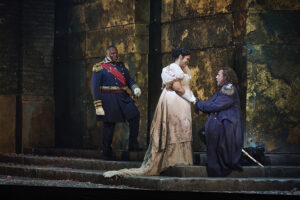By Neil Armstrong
Photo by Michael Cooper
Renowned soprano Sondra Radvanovsky’s title role in the opera, “Medea,” by Luigi Cherubini, is a tour de force which begs the question — how does she manage to sustain the demands on her voice for so long on stage — almost the entire opera? The singer’s role is musically and dramatically complex, as well as physically highly demanding.

The Canadian Opera Company (COC) says Cherubini’s “Medea” is “revered as one of the most difficult works in the operatic canon: a rarely performed masterpiece of unparalleled emotional and musical intensity. It notes that this new production from acclaimed director Sir David McVicar brings the story of the vengeful sorceress Medea to fresh life in what promises to be a landmark event of the season.
“When the sorceress Medea discovers her husband has taken their children and abandoned her for a king’s daughter, she embarks on a scorched earth quest for vengeance, destroying everything—and everyone—in her way,” notes a short synopsis of the opera.
The tragedy in three acts was first performed at the Théâtre Feydeau in Paris on March 13, 1797, with original French libretto by Francois-Benoit Hoffman. It was composed towards the end of the French Revolution “and presents a musical and dramatic bridge between the Classical and Romantic eras, while also capturing a widespread emotional reaction to the shocking cruelty and bloodshed of the recently concluded Terror,” writes the COC.
The Italian translation by Carlo Zangarini for the opera’s premiere at La Scala in 1909 became the standard version performed for the rest of the twentieth century. This version also introduced new recitatives that replaced the old spoken dialogue. The opera had its Canadian Opera Company (COC) premiere in Toronto on May 3.
From her Act I aria with Giasone to the furious destruction of the final scene, Medea is a scorching presence on stage: a character whose capacity for passionate love and the cruellest violence makes her one of opera’s most challenging parts to play, notes the program.
Radvanovsky delivers a powerful performance in her role of Medea which is “famously difficult, reaching the very top of the soprano vocal range. McVicar has described the opera singer, who starred in the Met’s premiere production of the opera in 2022, as “one of the few sopranos in the world that could take this on.” His set design features impressive and massive walls, mirrors, barriers, and doors, emphasizing “Medea’s isolation and exclusion from society as well as those she loves most dearly.”
It was a delight to hear the arias of bass-baritone Alfred Walker (King Creonte), tenor Matthew Polenzani (Giasone), soprano Janai Brugger (Glaucce), and mezzo-soprano Zoie Reams and see the emotions they display in performing this story. The Black cast members are African Americans Walker, Brugger and Reams, and Toronto’s own soprano and singer/songwriter Charlotte Siegel, a member of the COC’s Ensemble Studio who plays the Handmaiden of Glauce 1.
The co-production of The Metropolitan Opera, Greek National Opera, Lyric Opera of Chicago, and the COC includes among its cast Chiara Isotton who will play Medea on May 15 and 17; Alex Halliday as Captain of the Guard; and Alex Hetherington, Handmaiden of Glauce 2.
The creative team includes conductor Lorenzo Passerini, director and set designer Sir David McVicar, associate director Jonathon Loy, costume designer Doey Lüthi, lighting designer Paule Constable, associate set designer Hannah Postlethwaite, revival lighting designer Clare O’Donoghue, projection designer S. Katy Tucker, associate projections designer Blake Manns, movement director Jo Meredith, price family chorus master Sandra Horst, stage manager Stephanie Marrs, surtitles producer John Sharpe, and surtitles writer Christopher Bergen.
“Medea” is now on at the COC’s Four Seasons Centre for the Performing Arts on May 9, 11, 15 and 17. It is sung in Italian with English surtitles.


